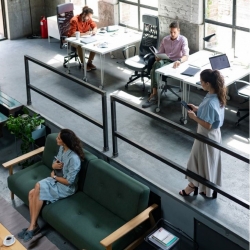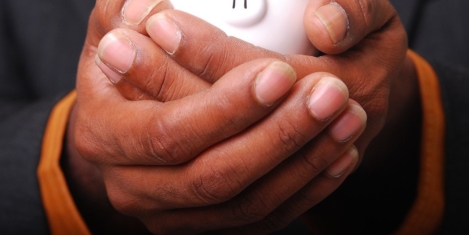January 7, 2021
Search Results for: change
January 7, 2021
Giving CEOs financial incentives seems to damage long-term profitability
by Jayne Smith • Business, News
 The greater stress companies put on financial incentives and financial performance in bonus systems for CEOs, the more negative the impact is on the firm’s financial performance, claims new research from Vlerick Business School. These findings come from a research study into the top 600 European firms and their CEOs remuneration. (more…)
The greater stress companies put on financial incentives and financial performance in bonus systems for CEOs, the more negative the impact is on the firm’s financial performance, claims new research from Vlerick Business School. These findings come from a research study into the top 600 European firms and their CEOs remuneration. (more…)
December 18, 2020
Working from home stresses have had the greatest impact on women
by Neil Franklin • Flexible working, News, Wellbeing
 A review of research in organisational and workplace psychology conducted by an international team of academics claims that working from home has been more disruptive for women than men. The review paper, entitled COVID-19 and the Workplace: Implications, Issues, and Insights for Future Research and Action and originally published in American Psychologist, features urgent insight from UCL School of Management Professor, Sunny Lee into the sex- and gender-related implications of changes in work practices that have taken place over the course of 2020. (more…)
A review of research in organisational and workplace psychology conducted by an international team of academics claims that working from home has been more disruptive for women than men. The review paper, entitled COVID-19 and the Workplace: Implications, Issues, and Insights for Future Research and Action and originally published in American Psychologist, features urgent insight from UCL School of Management Professor, Sunny Lee into the sex- and gender-related implications of changes in work practices that have taken place over the course of 2020. (more…)
December 17, 2020
Organisations weigh up options to make workplace fit for the future
by Neil Franklin • News, Property
 Avison Young, realestateworks and HLM Architects have launched a new report that assesses the impact of this year’s pandemic on workplace and corporate real estate strategies in the longer-term. Over 100 private and public sector companies were asked about their evolving approach to working culture, office design and portfolio strategies in the context of multiple forces of change, including greater resilience, the decarbonisation agenda, personalisation, remote working and the integration of the physical and virtual workspaces. (more…)
Avison Young, realestateworks and HLM Architects have launched a new report that assesses the impact of this year’s pandemic on workplace and corporate real estate strategies in the longer-term. Over 100 private and public sector companies were asked about their evolving approach to working culture, office design and portfolio strategies in the context of multiple forces of change, including greater resilience, the decarbonisation agenda, personalisation, remote working and the integration of the physical and virtual workspaces. (more…)
December 16, 2020
Less than half of employers plan to take on a young person next year
by Neil Franklin • News, Working lives
 Only 46 percent of employers plan to hire a young person between the age of 16 and 24 in the next year despite new Government incentives to do so, a report from the CIPD suggests. Over 1,000 employers were surveyed for the CIPD’s COVID-19 and the youth labour market report which examines the likely impact of new incentives to boost provision of traineeships, apprenticeships, and six-month work placements through the Kickstart scheme – as outlined in the ‘Plan for Jobs’, which was presented to Parliament in July 2020. (more…)
Only 46 percent of employers plan to hire a young person between the age of 16 and 24 in the next year despite new Government incentives to do so, a report from the CIPD suggests. Over 1,000 employers were surveyed for the CIPD’s COVID-19 and the youth labour market report which examines the likely impact of new incentives to boost provision of traineeships, apprenticeships, and six-month work placements through the Kickstart scheme – as outlined in the ‘Plan for Jobs’, which was presented to Parliament in July 2020. (more…)
December 16, 2020
People centric innovation will be key business priority in near future
by Jayne Smith • Business, News
 The pandemic has shaken up business priorities and many predict that it will continue to have lasting influence on the future direction of organisations. It is predicted that innovation and more compassionate leadership will take centre stage, according to a new study by ‘Future Trends in Leadership & Management – shifting priorities’, from The Institute of Leadership & Management. (more…)
The pandemic has shaken up business priorities and many predict that it will continue to have lasting influence on the future direction of organisations. It is predicted that innovation and more compassionate leadership will take centre stage, according to a new study by ‘Future Trends in Leadership & Management – shifting priorities’, from The Institute of Leadership & Management. (more…)
December 15, 2020
Preparing for a mental health epidemic is a shared responsibility
by Sheena Pirbhai • Comment, Wellbeing
 With the continuous impact of the pandemic on people’s mental health due to isolation, work uncertainty, and anxiety over health, the topic has been dominating the news, begging the question of how we can achieve accessible and cost-effective treatment for all and prevent the expected acceleration of mental health issues in the coming months. As we juggle a different type of work-life balance brought about by working from home and the added worry of how the pandemic is affecting us, there is no doubt that our daily lives have been disrupted. The statistics are alarming; 60 percent of adults reported their mental health had gotten worse during the COVID-19 lockdown, and 51 percent said their mental health has got worse during this period. (more…)
With the continuous impact of the pandemic on people’s mental health due to isolation, work uncertainty, and anxiety over health, the topic has been dominating the news, begging the question of how we can achieve accessible and cost-effective treatment for all and prevent the expected acceleration of mental health issues in the coming months. As we juggle a different type of work-life balance brought about by working from home and the added worry of how the pandemic is affecting us, there is no doubt that our daily lives have been disrupted. The statistics are alarming; 60 percent of adults reported their mental health had gotten worse during the COVID-19 lockdown, and 51 percent said their mental health has got worse during this period. (more…)
December 15, 2020
The majority of employees admit to boozing while working from home
by Jayne Smith • News, Wellbeing, Working lives
 To say that 2020 has been a tough year is an understatement, and it appears that there has been an increase in the amount of alcohol being consumed whilst working from home since the pandemic began, according to Health and Safety software company Protecting.co.uk. (more…)
To say that 2020 has been a tough year is an understatement, and it appears that there has been an increase in the amount of alcohol being consumed whilst working from home since the pandemic began, according to Health and Safety software company Protecting.co.uk. (more…)
December 15, 2020
The FM industry is held back by short-term thinking, research claims
by Jayne Smith • Business, Facilities management, News, Working culture
 Research published by VINCI Facilities claims that there is a lack of long-term strategic thinking amongst FM service providers and their customers that is limiting an opportunity to yield substantial business and social benefits. (more…)
Research published by VINCI Facilities claims that there is a lack of long-term strategic thinking amongst FM service providers and their customers that is limiting an opportunity to yield substantial business and social benefits. (more…)
December 12, 2020
Listening in on an enormous conversation about the workplace
by Mark Eltringham • Comment, Workplace design
One of the best tricks Clive James ever pulled was finding acceptance as a public intellectual in the UK. It’s not easy in a country in which it is possible to be too clever by half or even too clever for your own good. Stephen Fry continues to pull it off as does Mary Beard, but it’s a hell of a thing to achieve. In the UK it seems to rely on straddling at least two worlds. (more…)
December 11, 2020
COVID-19 causes cultural shift in UK organisations approach to employee health and wellbeing
by Jayne Smith • News, Wellbeing, Working culture
 Research by employee benefits provider Unum, claims 86 percent of UK employers surveyed are changing their approach to employee health and wellbeing in light of the current pandemic. Almost all employers surveyed (95 percent) say it has impacted their need to make people feel more protected, with many focusing their health and wellbeing strategies on preventative measures, like mental health advice and support. (more…)
Research by employee benefits provider Unum, claims 86 percent of UK employers surveyed are changing their approach to employee health and wellbeing in light of the current pandemic. Almost all employers surveyed (95 percent) say it has impacted their need to make people feel more protected, with many focusing their health and wellbeing strategies on preventative measures, like mental health advice and support. (more…)







 Organisations face a crisis of trust this year if they continue to make workplace decisions in the dark, according to employee experience platform,
Organisations face a crisis of trust this year if they continue to make workplace decisions in the dark, according to employee experience platform, 



















December 18, 2020
Events of 2020 have proved the value of personal resilience
by Silja Litvin • Comment, Wellbeing